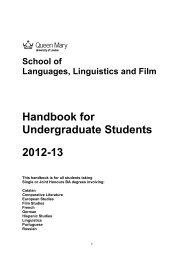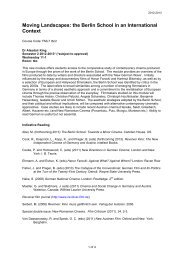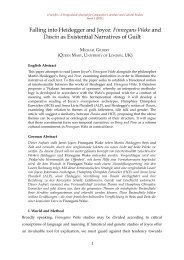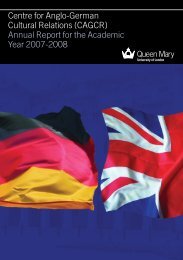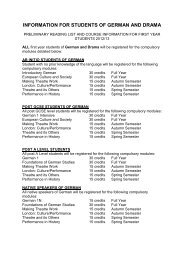You also want an ePaper? Increase the reach of your titles
YUMPU automatically turns print PDFs into web optimized ePapers that Google loves.
eTransfers. A Postgraduate eJournal for Comparative Literature and Cultural Studies<br />
Issue 1 (2011)<br />
This general embedding of literary fiction in the surrounding real world suggests<br />
that fiction in general can serve as a source of knowledge formation. There are,<br />
however, differences between diverse sub-genres of fiction as far as the type of<br />
knowledge is concerned that they are most apt to generate. For instance, the novel of<br />
ideas — such as, for example, Thomas Mann’s The Magic Mountain — is characterised<br />
by its rather straightforward relations with extra-literary ideas. Reference to items of<br />
propositional knowledge existing as ideas in the real world are clear, which enables<br />
the reader quite literally to learn facts about the world, or at least to comprehend cer-<br />
tain debates between, say, opposed intellectual standpoints, such as Settembrini’s<br />
and Naphta’s. Depending on the intellectual level on which these ideas are negoti-<br />
ated in a novel of ideas, however, quite advanced background knowledge is neces-<br />
sary to penetrate the fictional interdiscourse. Other sub-genres of fiction, such as love<br />
stories or psychological novels, do not refer so much to extra-literary items of pro-<br />
positional knowledge, but provide the source of a more subtle kind of knowledge,<br />
such as knowledge about how people might react in certain kinds of situations — de-<br />
scribed in terms of fictional, i. e. hypothetical and thus harmless, situations. This type<br />
of knowledge remains implicit in the narrative text rather than being explicit in terms<br />
of references to items of propositional knowledge. However, all narrative texts have<br />
in common the fact can serve as a basis for the generation of narrative knowledge.<br />
III. Three Types of Knowledge Developed in Narrative Fiction<br />
In contrast to the one-dimensional traditional concept of knowledge that concen-<br />
trates on propositional knowledge, this paper thus proposes two additional types of<br />
knowledge in order to grasp the potential of narrative fiction to form the basis for<br />
readers to generate knowledge. These additional types of knowledge are procedural<br />
knowledge and narrative knowledge. Using three types of knowledge for analysing<br />
literary fiction will arguably bring us closer to understanding the dynamics of know-<br />
ledge inherent in a work of fiction than concentrating solely on propositional know-<br />
9



